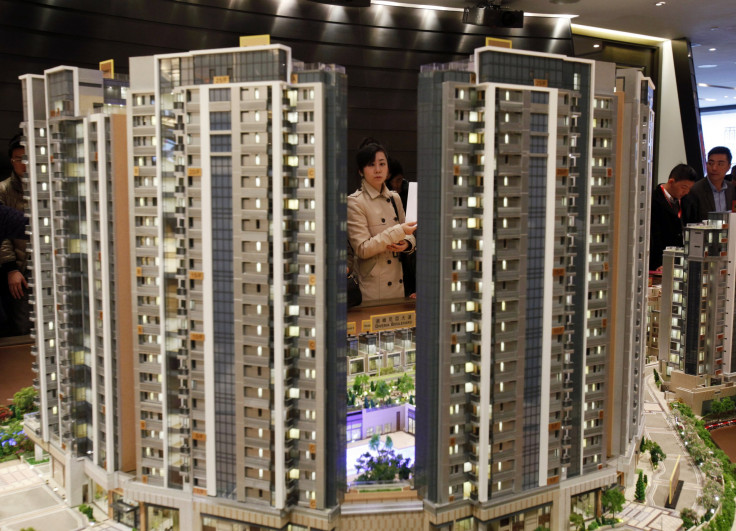Stress In China’s Property Market A Risk To Local Government Financing Vehicles (LGFV)

Multiple signs are pointing to stress in China’s real estate sector. The once widely held belief that home prices can only go up no longer applies, and banks are starting to suspend riskier lending to property developers, as they flee third - and fourth-tier cities, leaving behind a trail of unfinished apartment buildings to cut their losses.
Yu Xuejun, the head of Jiangsu province's banking supervision bureau, warned Tuesday against risks in the property market and the spillover effect of such risks to local government financing vehicles (LGFVs). Nomura’s Zhiwei Zhang pointed out in a note that Yu believes the boom in the property sector may be close to its end.
Yu told the Chinese-language newspaper Economic Information Daily that he expects “more significant divergence among property markets of different cities,” adding that “a small number of cities may maintain relatively high property price, but property bubbles in third - and fourth-tier cities cannot sustain.”
“Credit defaults will definitely happen,” Yu said. “It’s just a matter of timing, scale, and how big the impact is.”
He pointed out that once the cash flows of many small property developers, especially in third - and fourth-tier cities, become problematic, risks will emerge.
Since the late 1990s, local governments have been creating financing vehicles backed by land revenues and public assets to borrow money from banks or institutional investors for funding costly infrastructure and real estate development projects.
While owned by the local government, these financing vehicles can raise funds through the more traditional methods of taking bank loans, issuing bonds, and via equity market initial public offerings, as well as via shadow banking activities such as trust loans.
If property developers run into cash flow problems, not only will they stop buying land, which is a major source of revenue for local governments, they cause the souring of LGFV debt.
Property Trusts Facing Default Risk
China’s property trusts must repay 634 billion yuan of debt this year, up 50 percent from 2013, according to estimates from Haitong Securities Co., the nation’s second-biggest brokerage. To put things into context, that’s the equivalent of the size of Puerto Rico’s economy.
China's trust companies provided more than 10 times as much new funding to the property sector in the last three months of 2013 as they did a year earlier, data from the China Trustee Association, a government-backed industry group, showed. Trusts issued 139.5 billion yuan worth of net new funding to the property sector, up from only 11.6 billion yuan a year earlier.
According to China's central bank, net new bank loans to property developers in the fourth quarter of 2013 came to only 80 billion yuan, a bit less than 60 percent of the amount of trust financing. This is the first time since mid-2011 that financing provided by trust companies to property developers exceeded that made available by banks.
As the economy slows and real estate prices fall in some regions, there is an increasing likelihood that some developers that borrowed from these property trusts won’t be able to repay their debt, which in turn makes it harder for the trusts to meet their obligations to investors.
The first wave of defaults was linked to the struggling coal mining industry. In the past few months, at least two different trust companies have notified investors about defaults by borrowers. “The second wave of defaults may be in property trust products,” said David Cui, China strategist at Bank of America Merrill Lynch.
Data from the National Bureau of Statistics showed that the growth of house prices in 70 major Chinese cities slowed for the first time in 14 months in January, with prices in five cities, including Wenzhou and Hangzhou, seeing a month-on-month decline.
Local media reported that some real estate developers lowered prices in east China's Hangzhou and Changzhou cities and a commercial bank's decision to halt some property financing business. The moves triggered protests from customers who had bought apartments before the price cuts.
Industrial Bank Co., Ltd. (SHA:601166) said in a statement on Feb. 24 that it had halted some types of loans to property developers until the end of March and tightened lending to real estate-related industries, including steel and cement, Shanghai Securities News reported.
Pace Of Urbanization To Slow
In addition, the pace of China's urbanization is set to slow and its contribution to economic growth is set to decline.
“While urbanization has undoubtedly served as a pillar of growth in the past, we believe it may become a source of future volatility and risk,” Nomura’s Zhang said.
The rate of urbanization in China has already showed signs of significant slowdown in recent years. In 2013, the urbanization ratio, measured as the urban population’s share of the total population, rose by only 1.16 percentage points. That’s the slowest since 1996, except for 2008, when the global financial crisis hit China.
Growth of the urban population has also fallen in the last three years, to 2.7 percent in 2013 from 3.9 percent in 2010, having averaged 4.0 percent from 2000 to 2010. Nomura economists believe urbanization is set to slow further.
“We continue to view the property sector overinvestment as the top risk for China's economy for 2014 and 2015,” Nomura’s Zhang said. “The slowdown of the urbanization process exacerbates this risk.”
© Copyright IBTimes 2024. All rights reserved.






















